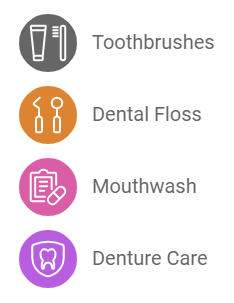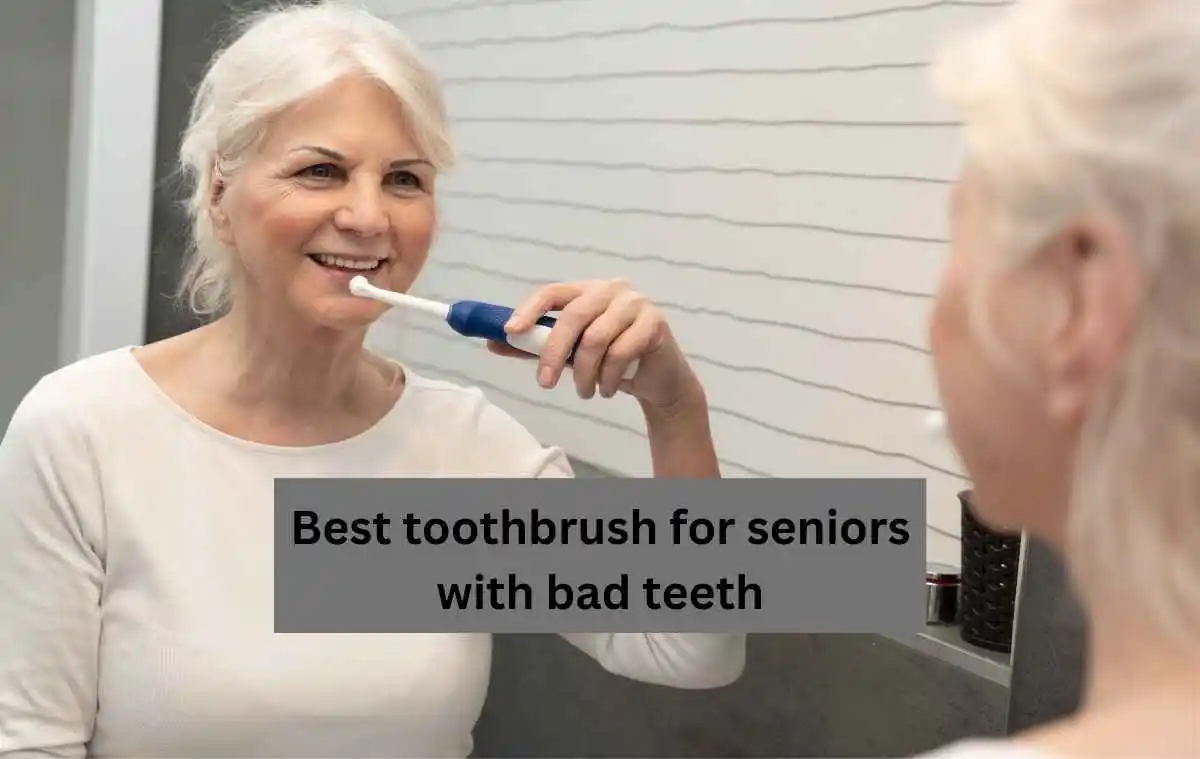Always choose soft bristled toothbrush for seniors with bad teeth. Soft bristles are gentle on sensitive gums. Hard bristles can be cause pain in the mouth. The Philips Sonicare Protective Clean is a top choice for seniors with dental problems. Its gentle sonic vibrations clean plaque effectively without harsh scrubbing, easier on soft gums and sensitive teeth.
A pressure sensor prevents overbrushing too. With a simple button and timer, it provides thorough cleaning easily. The curved neck allows access to back teeth. The sonic motions and monitoring make it easier than manual brushing to maintain hygiene for seniors. Its curved neck and compact brush head allow for easier access to the back teeth.
The ProtectiveClean provides a comfortable yet effective cleaning, making it the best electric option for senior oral healthcare needs. The sonic motions and pressure monitoring features help maintain oral hygiene more easily than a manual brush.
Table of Contents
- Type of toothbrush should a senior use
- Best Dental Care Tools for Seniors
- Oral Health and Cancer Screening
- best toothbrush for seniors with bad teeth
- why are standard toothbrushes not always suitable for seniors
- What to consider when choosing a toothbrush for a Senior person
- what is the alternative of brushing teeth for the elderly
- Benefits of Using an Electric Toothbrush for Adults & Seniors
- Key takeaways
Type of toothbrush should a senior use
They Can use a soft bristled tooth brush. Soft bristles are gentle on sensitive gums. Hard bristles can be cause pain in the mouth. They should also consider an electric toothbrush. The sonic or rotating motions of an electric brush deliver effective plaque removal without the need for vigorous scrubbing pressure. This makes brushing easier on arthritic hands or joints.
Look for features like a large handle grasp, two-minute timer, and gentle pulsations that guide thorough brushing without strain. A pressure sensor prevents overscrubbing fragile gums. Seniors may also benefit from an angled brush neck for improved reach to back teeth.
Best Dental Care Tools for Seniors

Toothbrushes
Electric toothbrushes with soft bristles, like the Philips Sonicare ProtectiveClean or Oral-B Genius. Guided vibrations are gentler than manual brushing. Extra-large toothbrush handles for arthritic hands. Options include Colgate Hum Smart Electric or Aquafresh Extra Care Manual.
Dental Floss & Picks
Floss threaders help thread floss between teeth more easily. Platypus or Glide are good brands. Interdental brushes clean between teeth when flossing is difficult. Opt for extra soft or x-soft bristle sizes from TePe or Colgate. Picks with ergonomic or triangular grips prevent finger pain, like Plackers Dental Care or Curaprox.
Mouthwash
Alcohol-free options include Listerine Zero, ACT, or Smart Mouth to prevent dry mouth. Mouthwashes with caffeine help reduce plaque, like Listerine PocketFresh. Therabreath Fresh Breath Oral Rinse eliminates bad breath for days.
Denture Care
Polident or Efferdent tablets, or a SonicScrubber clean dentures thoroughly without scrubbing. For sore spots, apply Fixodent denture adhesive or super Poligrip for a comfortable, all-day fit. Denture Brite soaks or Snow Denture Cleanser safely disinfect complete or partial dentures.
Oral Health and Cancer Screening
It’s important for seniors to continue regular oral health exams and cancer screenings as they age. Even routine dental checkups and cleanings can help detect early signs of issues. Some key reasons include:
- Oral cancers are more common in older adults, with over 50% of mouth cancers occurring in people over 55. Regular screenings can find tumors at earlier, more treatable stages.
- Periodontal (gum) disease risk increases with age. Exams allow the dentist to monitor receding gums and bone loss. This may identify underlying conditions like diabetes.
- Other mouth issues are more prevalent as we age, such as tooth decay, chronic bad breath, mouth sores or infections. Screenings ensure proper management.
- Dentists perform a thorough exam of the mouth, tongue, lips and throat – areas not always visible without their inspection.
- It’s important for seniors to continue established prevention through cleanings, fluoride, and maintaining dental appliances. This supports overall health.
Regular screenings, even just once per year after age 65 if there are no existing problems, can detect serious conditions early before they spread or worsen quality of life. Partnering with a dentist supports optimal oral and whole-body health in senior years.
best toothbrush for seniors with bad teeth
best toothbrush for seniors with bad teeth are Philips Sonicare ProtectiveClean . This is a highly effective yet gentle option. The sonic vibrations clean plaque well without scrubbing. Its pressure sensor prevents overbrushing gums.
Oral-B Pro . The cross-shaped bristles clean from a multiple angles. A pressure sensor protects gums from injury. It has a simple on/off button and 2-minute timer.
Colgate Hum . This connects to an app for customized brushing guidance. Vibration settings address different needs. Its curved handle promotes a natural grip.
Waterpik Sonic-Fusion . Combining sonic motions and pulsating water jets deeply cleans plus massages gums. Large buttons are intuitive to operate.
Dr. Collins Sonic . An affordable choice with a soft brush head providing 30-second cleaning pulses. Its contoured handle promotes comfort.
Look for electric options with soft bristles for sensitive teeth and gums, 2-minute timers to ensure thorough brushing, and extra-large handles for easier grasping. Vibrating cleaners are easier on arthritic hands compared to manual brushing.
why are standard toothbrushes not always suitable for seniors
The handles on standard toothbrushes are often too small and narrow . Arthritis makes it difficult for seniors to apply enough pressure for best cleaning. Larger handles provide an easier grasp. Manual brushing can also strain aging joints.
Seniors are more prone to gum disease as gums recede with time. Standard brush bristles may be too harsh, even medium-firm ones, scrubbing away delicate gum tissues. Softer bristles are gentler on receding gums and older root surfaces. It can get harder to reach all areas of the mouth like back teeth. Standard brush heads don’t always provide optimal access. Wider or angled heads on some senior toothbrushes give better coverage.
Deteriorating dexterity issues common in aging make it difficult to clean thoroughly with a manual brush. Vibrating or pulsating electric brushes can help compensate, guiding seniors through an even clean. So while standard toothbrushes served them well earlier, special senior designs address health and ability changes that come with advancing years. This ensures effective yet comfortable oral hygiene.
What to consider when choosing a toothbrush for a Senior person
Here are some important factors to consider when choosing a toothbrush for a senior:
- Handle size . Look for an extra-large handle that is comfortable for hands with arthritis or reduced dexterity to grasp.
- Bristle hardness . Soft bristles are best for seniors as they are gentler on receding gums and worn enamel. Hard bristles can be abrasive.
- Brush head . Wider brush heads with tapered bristles can reach back teeth easier. Angled necks also improve access.
- Brush head replacement . Given age-related tooth and gum changes, consider how easy/affordable it is to replace brush heads periodically.
- Bristle motion . Rotating or vibrating bristles of an electric toothbrush make brushing easier than manual. Many have a 2-minute timer too.
- Ease of use . Simple button controls and handles that require less dexterity/grip strength make brushing less strenuous.
- Portability . Look for compact, lightweight designs if the senior has mobility issues.
- Dentist approval . Choosing a brush recommended by the senior’s dentist ensures it meets their specific needs.
- Considering factors like ergonomics, gentle cleaning action, and convenience supports independent oral care as seniors age.
what is the alternative of brushing teeth for the elderly
For elderly individuals who have difficulty brushing their teeth, there are still ways to keep oral hygiene in check. Water flossers provide gentle irrigation between teeth and below the gumline as an easier floss alternative. Interdental brushes of varied softness also clean spaces that regular brushing misses.
Electric toothbrushes with large handles offer assisted brushing motions while requiring less scrubbing effort. Mouthwashes kill germs without manual work. Chewable xylitol products massage gums and address dental issues. Denture wearers should soak and scrub removable appliances daily to prevent infection. Consulting with their dentist, seniors can identify the most suitable supplementary cleaning methods to support a healthy smile.
Benefits of Using an Electric Toothbrush for Adults & Seniors
Removes Plaque More Effectively
This disrupts more plaque accumulation on tooth surfaces. Their automated motions allow for greater coverage of all tooth and gumline areas. This exceeds what can be achieved by hand alone. Studies show electric toothbrushes remove up to 100% more plaque from hard to reach areas compared to manual brushing. Better plaque removal reduces gum disease and cavities.
Massages & Stimulates Gums
The pulsating or rotational motions have an additional benefit of gently massaging gums. This improves blood flow to the tissues. Healthier gums mean less recession over time. Massaging also strengthens attachments between teeth and gums. Some electric brush heads feature a gum stimulation setting. used regularly, it can help reduce likelihood of gum disease progression.
Timers Promote Thoroughness
This ensures adequate brushing time for each session. Manual brushers often skimp on time leading to missed areas. Electric brush timers signal when to move on to the next zone of the mouth. Following the full timer helps cover all tooth surfaces properly for maximum cleaning impact and protection against cavities.
Easier on Joints & Muscles
Brushing teeth requires motion of wrists, fingers, arms and shoulder muscles. Repetitive manual brushing can be taxing. Electric toothbrush handles eliminate the need for much motions beyond powered vibration or rotation patterns. This makes brushing easier on sore or arthritis-affected joints. It brings relief to those with limited dexterity as well.
Better Option for Seniors
The self-driven motions of electric brushes makes them highly suitable for senior citizens. Their large, easy grip handles accommodate less flexibility and hand strength comfortably.
Multiple brushing modes address varying oral care needs as seniors age, like softer cleaning or massaging. Transportable, lightweight designs exist for independent brushing even in assisted care facilities. Overall, electric toothbrushes support continued personal dental hygiene for improved senior quality of life.
Key takeaways
- Electric toothbrushes remove more plaque . Their oscillating motions disrupt more plaque than manual brushing.
- Gently massage gums . The pulsations improve gum health by enhancing blood flow.
- Ensure full 2-minute sessions . Timers make sure all areas are cleaned versus missing spots.
- Reduce joint/muscle strain . Powered handles avoid strenuous brushing motions.
- Support senior oral care . Features like large grips and modes help maintain hygiene with ease.


1 thought on “Best toothbrush for seniors with bad teeth”